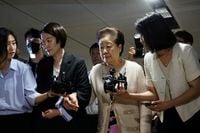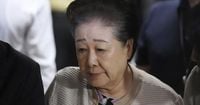South Korean authorities have taken a dramatic turn in a widening corruption investigation, requesting an arrest warrant for Hak Ja Han, the 82-year-old leader of the Unification Church, on allegations of bribery and incitement to destroy evidence. The move, announced on September 18, 2025, comes just one day after Han was questioned for nearly ten hours by investigators probing her alleged role in a complex web of political bribery involving the wife of jailed former President Yoon Suk Yeol and a prominent conservative lawmaker.
The case, which has gripped South Korea’s political and religious landscape, centers on claims that the Unification Church, officially called the Family Federation for World Peace and Unification, sought to exert influence at the highest levels of government. According to the Associated Press, investigators allege that Han and church officials offered bribes to Kim Keon Hee, Yoon’s wife, and Kweon Seong-dong, a staunch Yoon loyalist and conservative lawmaker, in exchange for business favors and political support.
Kim Keon Hee, who was arrested and charged last month, faces accusations including bribery, stock manipulation, and meddling in legislative candidate selection. Her legal team has denied all charges. Kweon Seong-dong, arrested earlier this week, has also denied receiving any money from the church. The Unification Church, for its part, has fiercely rejected the allegations, insisting that Han “does not pose a flight risk or a threat of destroying evidence, and has cooperated with the probe even while recovering from a heart procedure this month.” In a statement, the church declared, “Requesting an arrest warrant for an internationally respected religious leader without presenting clear evidence is an excessive move that disregards even the most basic respect due to a religious leader.”
Prosecutors have painted a different picture. According to Reuters, Han is suspected not only of bribery but of incitement to destroy evidence—a charge that has added urgency to the investigation. The case hinges on claims that Kim Keon Hee accepted luxury gifts via an intermediary from a Unification Church official, who allegedly sought the church’s participation in a Cambodian development project. This official, now under arrest, is also accused of providing 100 million won (approximately $72,400) in bribes to Kweon Seong-dong.
The investigation has expanded beyond the individuals directly involved, with authorities scrutinizing the Unification Church’s broader political influence. According to Devdiscourse, investigators visited the headquarters of the conservative People Power Party on September 18, 2025, seeking documents related to allegations that church members signed up en masse before the party’s 2023 leadership race, potentially to boost Kweon’s candidacy. The party, which has deep ties to the country’s conservative establishment, has not commented publicly on the visit.
This probe is just one of three special prosecutor investigations launched by Seoul’s new liberal government, all targeting Yoon’s presidency. The other two focus on Yoon’s controversial imposition of martial law on December 3, 2023—a move that led to his impeachment and removal from office in April 2025—and on allegations of a government cover-up surrounding a marine’s drowning death during a 2023 flood rescue operation. These overlapping scandals have laid bare the fraught power dynamics and persistent allegations of lawbreaking that have come to define South Korean politics in recent years.
For many South Koreans, the Unification Church’s involvement in the scandal has revived longstanding debates over the group’s outsized role in public life. Founded in 1954 by Sun Myung Moon, Han’s late husband, the church has long been a lightning rod for controversy. Its teachings center on Moon’s self-proclaimed status as the Second Coming, and the group is perhaps best known internationally for its mass wedding ceremonies, which pair thousands of couples—often from different countries—in elaborate, globally televised events. Critics, including many in the South Korean press, have described the church’s culture as “cult-like,” and followers are sometimes derisively called “Moonies.”
Yet the Unification Church’s reach extends far beyond the spiritual. According to Reuters, the group has built a sprawling business empire encompassing media, tourism, and food distribution, among other sectors. This economic influence has, over the decades, allowed the church to cultivate relationships with political and business elites both in South Korea and abroad. The current investigation, with its focus on alleged efforts to sway political races and secure lucrative business deals, has only heightened concerns about the group’s entanglement with the country’s corridors of power.
Han’s questioning on September 17, 2025, lasted nearly ten hours, with investigators pressing her about the church’s finances, its connections to key political figures, and the role of the arrested official accused of acting as a go-between for the bribes. Han and church representatives have maintained that the official “overstepped his authority and acted on his own,” distancing the organization’s leadership from the most serious allegations. Still, prosecutors believe Han’s position at the top of the church hierarchy makes her central to any decisions regarding political donations and business ventures.
As the legal process unfolds, all eyes are on the upcoming court hearing scheduled for Monday, September 22, 2025, which will determine whether Han is formally arrested. The decision is expected to send ripples through both the religious and political establishments. For the Unification Church, the stakes are particularly high. The group has weathered numerous scandals over the decades, but never before has its top leader faced the prospect of arrest on such serious charges. For the South Korean government, the investigation is a test of its commitment to transparency and the rule of law, especially given the high-profile nature of those involved.
Meanwhile, the country’s political class is bracing for further fallout. The People Power Party, already reeling from the arrest of one of its key lawmakers, faces mounting scrutiny over its ties to the church. The liberal government, which has staked much of its political capital on rooting out corruption and abuse of power, must now navigate the delicate balance between respecting religious freedoms and holding powerful organizations to account.
As the drama continues to unfold, ordinary South Koreans are left wondering just how deep the connections between faith, money, and politics truly run in their country. The outcome of the court hearing—and the broader investigations—could provide some long-awaited answers.



